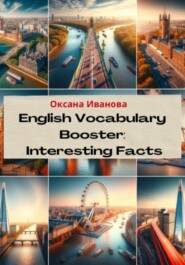скачать книгу бесплатно
to tear their prey apart – разрывать добычу на части
spinning – вращение
lifespan – продолжительность жизни
species – виды
VAMPIRES
Vampires are mythical creatures that have been featured in folklore and popular culture for centuries. They are typically depicted as undead beings that feed on the blood of the living.
The word "vampire" comes from the Serbian word "vampir", which means "bloodsucker".
Vampires are often associated with bats, and some cultures believe that vampires can transform into bats.
In some cultures, vampires are said to be repelled by garlic, sunlight, and running water.
The most famous vampire in literature is Count Dracula, created by Bram Stoker in his 1897 novel Dracula.
Vampires have been the subject of numerous films, television shows, and books.
There is no scientific evidence to support the existence of vampires.
Additional interesting facts:
Vampires are often depicted with sharp fangs, which they use to pierce the skin of their victims and suck their blood.
Vampires are often said to be immortal, and they can only be killed by a stake through the heart, decapitation, or exposure to sunlight.
Vampires are often associated with darkness and evil, but some cultures believe that they can also be benevolent creatures.
The vampire bat is a real animal that feeds on the blood of other animals, but it is not a mythical vampire.
WORDLIST:
mythical creatures – мифические существа
for centuries – на протяжении столетий
depicted as – изображаемые как
undead beings – нежить
bloodsucker – кровопийца
be repelled – отталкиваться
garlic – чеснок
sunlight – солнечный свет
count – граф
novel – роман
numerous – многочисленные
scientific evidence – научные доказательства
to support the existence – подтверждать существование
additional – дополнительные
sharp fangs – острые клыки
to pierce the skin – пронзать кожу
victims – жертвы
immortal – бессмертные
stake through the heart – кол в сердце
decapitation – обезглавливание
exposure – воздействие
darkness and evil – тьма и зло
benevolent creatures – доброжелательные существа
ANIME
Anime is a style of animation that originated in Japan.
The word "anime" is short for "animation".
Anime is typically characterized by its colorful graphics, vibrant characters, and exaggerated facial expressions.
Anime is popular all over the world, and there are many different genres of anime, including action, adventure, comedy, drama, and romance.
Some of the most popular anime series include Naruto, One Piece, and Dragon Ball Z.
Anime is often adapted from manga, which are Japanese comics.
Anime has been influenced by a variety of other art forms, including traditional Japanese painting, ukiyo-e prints, and Western animation.
Anime is often used to tell stories that are too complex or expensive to be told in live-action.
Anime has been credited with helping to popularize Japanese culture around the world.
Additional interesting facts:
The first anime series was produced in 1917.
The longest-running anime series is Sazae-san, which has been airing since 1969.
Anime is often used to promote Japanese products and tourism.
There are many anime conventions held around the world each year.
Anime has inspired a variety of other art forms, including video games, music, and fashion.
WORDLIST:
originated – возникла
Japan – Япония
typically – обычно
vibrant characters – яркие персонажи
exaggerated – преувеличенные
facial expressions – выражения лица
all over the world – по всему миру
action – экшн
adventure – приключения
romance – романтика
is often adapted from – часто адаптируется из
influenced by – под влиянием
complex – сложные
the longest-running – самый продолжительный
promote – продвигать
anime conventions – аниме-конвенции
has inspired – вдохновил
fashion – мода
SKIRTS
Skirts are a type of clothing worn around the waist that covers the legs.
Skirts are worn by people of all ages and genders, although they are most commonly associated with women.
Skirts come in a variety of lengths, from mini skirts to maxi skirts.
Skirts can be made from a variety of materials, including cotton, silk, denim, and leather.
Skirts can be plain or patterned, and they can be decorated with a variety of embellishments, such as beads, sequins, and lace.
Skirts can be worn for a variety of occasions, from casual to formal.
Skirts have been worn for centuries, and they continue to be a popular fashion item today.
Additional interesting facts:
The first skirts were made of animal skins and were worn by both men and women.
In the Middle Ages, skirts were often worn over breeches or trousers.
In the 19th century, skirts became more elaborate and were often worn with corsets.
In the 20th century, skirts became shorter and more casual.
Today, skirts are available in a wide variety of styles to suit all tastes and occasions.
Skirt lengths:
Mini skirt: above the knee
Knee-length skirt: at the knee
Midi skirt: below the knee but above the ankle
Maxi skirt: at or below the ankle
Skirt types:
A-line skirt: a skirt that is wider at the bottom than at the waist
Circle skirt: a skirt that is cut in a circle
Pencil skirt: a narrow, straight skirt
Pleated skirt: a skirt with pleats
